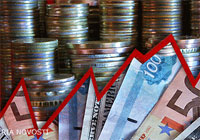Fund chief finds mixed messages on Russia’s pensions

(Moscow News – themoscownews.com – Nathan Gray – March 11, 2013)
It would be hard to find expats in Moscow who deny that life has become more comfortable here since 2000 – more expensive, but more comfortable.
Yet some people, such as Alexander Lorenz, do look back with nostalgia,
The chairman of the Raiffeisen Pension Fund, he arrived in Moscow in 2000 on a transfer from the London office of the European Bank for Reconstruction and Development, having spent 1994-1995 here as a university student.
“I actually look very fondly at the first years that I spent here,” he said. “Compared to how it was in 2000, 2001, it has lost its rawness a little bit.”
He admits, however, that even 2000 was nothing in comparison to the “rawness” of 1994. One benefit was the city’s informality, allowing newcomers to forge long-lasting contacts – especially since this longevity is valued in Russia.
“The relationships you could build at that time, they’re not replicable in that sense anymore,” he said. “Russians also go by how long they’ve known somebody, and a certain level of trust, which helps.”
A man of destiny
Lorenz feels he was always destined to come to Russia. He has spoken Russian since childhood, and his parents’ families fled the empire during the Revolution – his father’s from Moscow, his mother’s from Odessa.
He himself was born in Munich in 1973, and grew up in Hong Kong and Cologne. While a student at the University of Sussex, he spent 1994-1995 in Moscow, studying and working for his father, who had built a golf course 110 kilometers west of the city.
The course closed during the crisis in 1998, but Lorenz’s experiences working on it helped him realize the value of the contacts he had made.
“I think, through a lot of projects out of which nothing develops, you develop a lot of contacts that you then [have] basically all your life, especially in Russia, where contacts are everything,” he said.
The EBRD
Upon graduation in 1997, in economics and Russian, Lorenz was looking to begin a career in insurance. A second interest was Russia, and both of these expectations were met by an opening at the EBRD.
While his strategy to work on insurance projects succeeded at first, he still found himself moving into pension management.
“It just so happened that in Central and Eastern Europe at that time, pension reform was a big issue, particularly the Polish pension reform,” he said.
His small department – reduced to himself a year after he was hired – meant he had more responsibility than he had expected as a 24-year-old, though he does not regret it.
“That was, for me, the ideal school for learning tools that you would need in business life later on, and to carry responsibility that you would benefit from for a long time to come,” he said.
In 2000, Lorenz was granted the transfer to Moscow, joining ING the next year to build its pension product range in Russia. He moved to Raiffeisen in 2005 to do the same, and the company has grown to have 11 billion rubles ($358.4 million) under management.
Consumption psychology
The growth of the business has been fruitful, but Lorenz has identified several problems with the Russian market.
First is the historically negative Russian attitude toward saving, which he said had many different roots: inflation, pyramid schemes, bank collapses, and state losses in the Soviet period and perestroika.
“Consumption is a priority,” he said. “It’s nice not to have the problem to think about where to put your money. The psychological element, ‘If I spend it, I don’t take the risk of losing it.'”
A second problem comes at the level of policy. Since 2002, a mandated 6 percent contribution from every worker born in 1967 or later has formed a second pillar of the state pension system, which workers may then keep under state management or outsource to private funds. Since last year, the government has been considering reducing the contribution to 2 percent by Jan. 1, 2014, to fill a growing deficit in the State Pension Fund.
“On the one hand, it’s bad because it means fewer assets are accumulated in the second pillar… It also means that future cash flow is just reduced,” Lorenz said. “But – this is the interesting thing – everybody that signs up until the end of this year stays at 6, and that’s been an adrenaline shot for the industry. Everyone wants to sell as much as he can to lock in that 6 percent. If it was intentional, I would say it was an absolute genius move.”
Mixed messages from the government have made Lorenz doubt that the move was intentional, instead an example of “regulatory uncertainty” that is hampering the development of a strong pension management industry. The solution, he feels, is a mechanism to require employers and employees to create mandatory savings, even if it is at 1 or 2 percent of salary.
“You don’t feel it – it’s one or two lunches at a Moscow restaurant less per month,” he said. “But you feel the effect of having half a million rubles on your pension account after a number of years.”
At the foundation of the issue, however, lies a lack of understanding of pension fund management among the officials drawing up the regulations, he said.
“They see us as social institutions that are not there to create profit, and that’s a very, very big intellectual problem for us,” Lorenz said.
“If your counterparties do not believe you have the right to earn a profit, then we are talking on completely different levels, and that’s very difficult. Intellectually, it’s not good to start off on that foot.”
